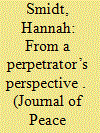|
|
|
Sort Order |
|
|
|
Items / Page
|
|
|
|
|
|
|
| Srl | Item |
| 1 |
ID:
144086


|
|
|
|
|
| Summary/Abstract |
Do international election observers deter or spur violence after election day? This article argues that only when conceptually and empirically distinguishing between violence by governments and opposition groups, can we assess the impact of international election observation. Disaggregating post-electoral violence uncovers that observers can deter governments from using force, but they have the opposite effect on opposition groups. When expecting criticism from observers, opposition leaders can easily deny their responsibility for violence by individual party militants, while weaponry and official insignia betray police and military involvement in violence and force the government to bear command responsibility. Governments also anticipate higher international costs for engaging in post-electoral violence than opposition groups, which are not usually targets of international punishment. On the other hand, international election observers unintentionally incite opposition groups to organize violence, as opposition groups seek to benefit from international attention and support that come with the presence of observers. Observers’ exposure of fraud reverses this differential effect: because governments expect international costs for election rigging anyway, observers cannot deter repression after highly fraudulent elections. But their alertness to electoral malpractice alleviates opposition groups’ incentives for post-electoral violence. Using data on 230 state-wide elections in Africa from 1990 to 2009, the analysis supports the observable implications of this argument. The findings of this article imply that international election observation missions make the post-electoral environment more peaceful when it comes to government repression after non-fraudulent elections. But observers ought to develop greater local expertise to identify opposition grievances before these groups resort to violence and be attentive to the possibility of increased repression after exposing cheating.
|
|
|
|
|
|
|
|
|
|
|
|
|
|
|
|
| 2 |
ID:
170814


|
|
|
|
|
| Summary/Abstract |
False information, rumours and hate speech can incite violent protest and rioting during electoral periods. To counter such disinformation, United Nations peacekeeping operations (PKOs) routinely organize election-education events. While researchers tend to study how PKOs affect armed group and state behaviour, this study shifts the focus to civilians. It argues that PKOs’ election education reduces violent protest and rioting involving civilians during electoral periods via three pathways. First, learning about PKOs’ electoral security assistance during election-education events may convince people that political opponents cannot violently disturb elections, thereby mitigating fears of election violence. Second, election-education events provide politically relevant information that can strengthen political efficacy and people’s ability to make use of peaceful political channels. Finally, peace messages during election-education events can change people’s calculus about the utility and appropriateness of violent behaviour. Together, these activities mitigate fears, reduce political alienation and counter civilians’ willingness to get involved in violence. To test these expectations, I combine survey data on people’ perceptions and attitudes, events data on violent protest and rioting, and a novel dataset on local-level election-education events carried out by the PKO in Côte d’Ivoire before four elections held between 2010 and 2016. The results show that when the PKO is perceived to be an impartial arbiter, its election-education events have violence-mitigating effects at the individual and subnational levels.
|
|
|
|
|
|
|
|
|
|
|
|
|
|
|
|
|
|
|
|
|